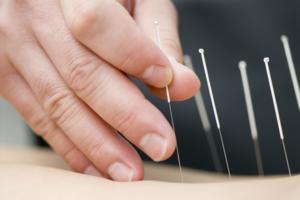![]() EXPERT
EXPERT
Jeff Rippey
Acupuncturist
- Saint Joseph, MO
- Colorado School of Traditional Chinese Medicine
- Accepting new patients
Why It's Hard To Tell Patients Where Needles Might Be Placed
I've been answering questions on this site for a couple of years now. There's been a recent trend towards acupressure questions which I addressed in my first blog post. Generally,...
Why It's Difficult to Answer Acupressure/Pressure Point Questions
As part of this site, patients have the capability of asking questions of practitioners and subject matter experts. Recently I’ve been seeing a lot of questions that take the...
Can acupuncture help with swollen ankles?
Acupuncture, and particularly moxibustion, can often help resolve swelling, but if there is an underlying heart issue that is left undiscovered or untreated the swelling is the least of your problems.
I'd suggest starting with your primary care physician to see if they can figure out why your ankles are swelling. If more serious root causes are ruled out, then you can pay a visit to NCCAOM.org and use their 'Find a Practitioner' link to get some local, board certified acupuncturists who may be able to help.
Where do acupuncture needles go for back pain?
For a longer answer, please see the following blog post: https://www.findatopdoc.com/Expert/81225813-Jeff-Rippey/Why-It-s-Hard-To-Tell-Patients-Where-Needles-Might-Be-Placed
Can acupuncture help varicose veins in legs?
More often, practitioners of Chinese medicine will utilize bleeding techniques to deal with varicose veins. It's complicated to explain why this works, but it often has a very beneficial effect on both the veins and any associated pain. Please note, the varicose veins themselves should NOT be bled; we're bleeding other superficial veins to reduce pressure on the venous system.
What are the acupuncture points for insomnia?
The short answer here is: in Chinese medicine there is no one point for the treatment of anything. The point or points that might be used are going to depend on why, from the perspective of the Chinese diagnostic model, any given individual is experiencing that issue. Different people can experience the same or similar health issues for a wide variety of underlying reasons. Each of those different underlying reasons has a different treatment. Without diagnosing and understanding why *you* are experiencing insomnia, it's impossible to give you a list of points.
Is there a pressure point to relieve foot pain?
Please read the following blog entry: https://www.findatopdoc.com/Expert/81225813-Jeff-Rippey/Why-It-s-Difficult-to-Answer-Acupressure-Pressure-Point-Questions
How do I unblock my nose with acupressure?
Please read the following blog post: https://www.findatopdoc.com/Expert/81225813-Jeff-Rippey/Why-It-s-Difficult-to-Answer-Acupressure-Pressure-Point-Questions
What pressure point relieves back pain?
Is acupuncture good for alcoholism?
If you're trying to make him stop drinking, there is no needle in the world that will accomplish the task if he's not ready to stop drinking.
Can acupuncture help with chronic sinusitis?
Can acupuncture help me stop smoking?
How long does it take for acupuncture to work for chronic back pain?
What point do you press for stomach pain?
If you've had severe pain for several days, I strongly suggest starting with your primary care physician. There are a handful of GI issues you could be experiencing which would cause pain like this and may require surgical or other intervention rather than Chinese medicine.
How quickly does acupuncture work for stress relief?
Can acupuncture help peptic ulcers?
Since you have a diagnosis in hand, I'm going to assume you've been to your primary care physician or a GI specialist. You need to talk with them to see whether or not there's H. pylori involvement and what their treatment regimen looks like. Once you understand the risks and benefits of the conventional approach, you can talk to a few local acupuncturists and see whether or not Chinese medicine might have anything that it can add for you.
How many acupuncture treatments are needed for acid reflux?
For starters, there are a variety of reasons in the Chinese medical model why someone might experience reflux. Some of those reasons are easier to treat than others and some individuals respond faster to treatment than others. I've had patients whose reflux responded in as little as 2-3 treatments and I've had patients who required weeks of treatment to get where they wanted to be.
Secondly, there are a variety of practitioners offering acupuncture or 'acupuncture-like' services. Some of them are well trained, some not so much. Even among board certified, state licensed acupuncturists some will be better with certain types of health issue relative to others.
At a minimum, it's probably going to take at least 3 treatments. It could go as many as 10.
There is at least one thing you can do to try to make sure you get relief in as few treatments as possible: make sure you're seeing a board certified, state licensed acupuncturist. At a minimum your provider should have either a Dipl AC or a Dipl OM credential from NCCAOM and either an L.Ac. or R.Ac. credential issued by the state. Without this, you're rolling the dice.
To find a provider like this in your area, go to NCCAOM.org and use their "Find a Practitioner" lookup. I'd get a list of local providers then call around to see if anyone specializes in GI issues and what their track record is with reflux.
How long after acupuncture do you feel better?
1. Your provider missed something during diagnosis and that has thrown their working hypothesis off. It happens a lot, Chinese medicine is looking at the body systemically and that means we're interested in *all* a patients symptoms, not just the symptoms that seem related to the issue at hand. I've had a lot of cases where it didn't feel like the treatments were getting anywhere then, out of the blue, the patient will mention some weird symptom that they didn't think was related but was actually the missing piece to the puzzle for me. Make sure your provider has the full picture of your presentation. If they didn't ask any questions about your health outside what's specifically going on with your headache, then see point #2.
2. Acupuncture, particularly in the US, is in a weird position at the moment. It's one of the only medical specialties that can often be practiced by other providers who have little to no actual training in the modality. Imagine if a podiatrist woke up one morning, decided to be a neurosurgeon, and there was nothing technically stopping them from doing that and you are getting the picture. Chinese medical school is a graduate level degree with most master's programs running 3-4 years and doctorates running 4-5. In many states a chiropractor can offer 'acupuncture' after 100 hours of training and physical therapists can often 'dry needle' with around 60 hours of training. This is a fraction the training of the average board certified, state licensed acupuncturist. Chiros and PTs mean well, and there is often nothing at the state level that prevents them from offering this service. From a patient perspective, though, it's a problem. As a patient, you want the person best suited to address your issue, and for acupuncture that's a board certified, state licensed acupuncturist - not a DC or a PT. You want someone with an NCCAOM national credential and an L.Ac. or R.Ac. credential issued by the state, anyone else is a crapshoot in terms of their ability to successfully apply acupuncture/Chinese medicine to your issue.
3. Lastly, and we don't really understand why this is, but statistically about 5% of people do not respond to acupuncture. Ever. Doesn't matter what provider they see or how many times they go, acupuncture doesn't produce results for them. If I were you, I'd try a 2-3 more treatments, making sure you're seeing an actual licensed acupuncturist (not a chiropractor or physical therapist), and if you're still not getting results you may be in that 5% group - unfortunately.
Can acupuncture cause flu like symptoms?
If the symptoms resolved in 24 hours or so, I'd be tempted to think coincidence. Still, it's worth having a discussion with your provider to see what they think.
Is acupuncture effective for depression?
If your depression tends more towards the severe end of the scale, though, you might think about combining acupuncture with, at a minimum, talk therapy. Sometimes, in severe cases, adding acupuncture to prescription medications will help a patient get where they want to be faster than either acupuncture or meds alone.
Can acupuncture cause pain?
Acupuncture needles are solid and we aren't injecting any substances. Acupuncture needles are also roughly the diameter of a cat whisker - so fairly thin. Does this mean they're painless? No. Patients might feel a slight pinching sensation on initial insertion. This feeling should fade in a second or two. If the sharp feeling remains then that's usually a sign the needle needs to be repositioned or removed; giving feedback to your provider is essential here so that you can remain comfortable during the treatment.
A dull aching sensation, a mild distending sensation, or a short lived tingling/pins and needles sensation that propagates up or down from the needle site are all normal. Again, if you're experiencing anything odd or unusual, speak to your provider about it to make sure needles don't need to be replaced or repositioned.
Can the procedure, in general, cause or exacerbate pain? The answer is, again, yes - but with a caveat. In the US acupuncture is currently in a weird position in that there are people who offer 'acupuncture-like' services without having actually been trained in Chinese medicine. Imagine if a podiatrist woke up one morning and decided they wanted to be a neurosurgeon and you get the general idea. These folks are well intentioned, some of them can achieve a decent level of skill, patients have no way of sorting the good practitioners from the bad. I've seen lots of patients who had 'acupuncture' from a chiropractor or 'dry needling' from a PT and those procedures either created new pain or made existing pain worse. In other words - if your acupuncture provider doesn't really know what they're doing, yes, acupuncture can cause pain or make existing pain worse.
Happily, there is a simple solution to this problem - always make sure you're seeing a nationally board certified, state licensed acupuncturist. There are two credentials potential patients are looking for: either a Dipl AC or Dipl OM national board credential combined with an L.Ac. or R.Ac. state credential. People with these have attended and graduated from an accredited school of Chinese medicine and passed a series of board examinations.
To find a provider like this, you can go to NCCAOM.org and use their 'Find a Practitioner' link. Most states also provide a facility to look up licensing for healthcare providers.





